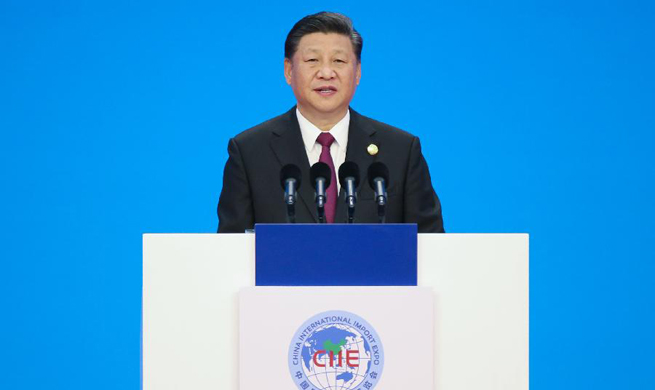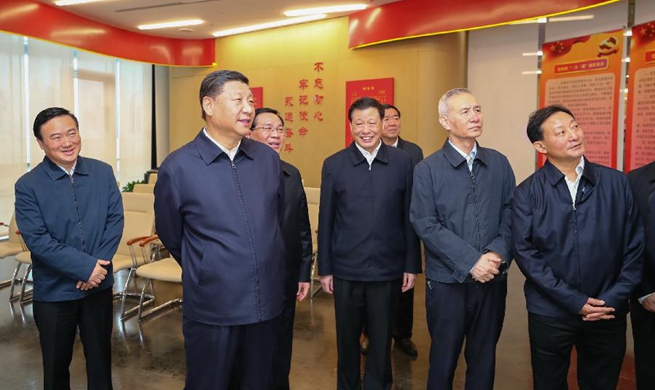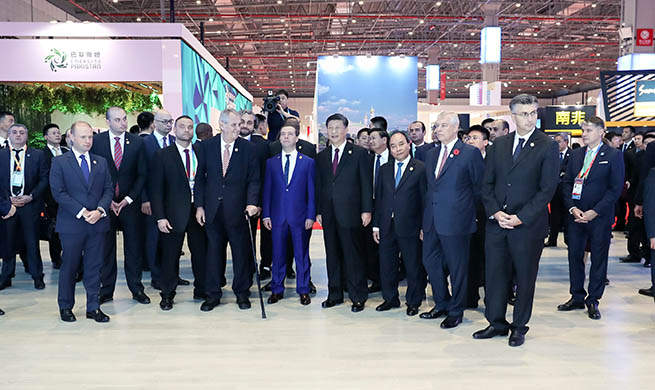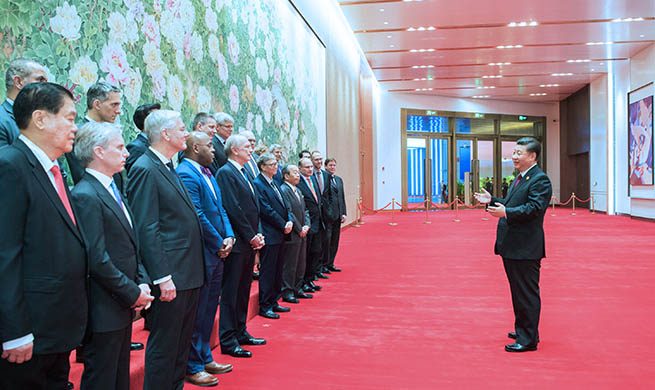CHONGQING, Nov. 6 (Xinhua) -- In the bustling village of Tuanjie in southwest China's Chongqing Municipality, rumbling trains stuffed with containers head for Germany's Duisburg more than 10,000 km away.
The freight trains are an inseparable part of the China-proposed Belt and Road Initiative (BRI). The train route starting in Chongqing transports some of the biggest freight among more than 50 China-Europe rail routes. Authorities aim to make Chongqing the biggest rail hub in Asia in the near future.
The project is gaining increasing steam partly thanks to powerful financial support. In 2016, with the help of financial institutions like China Citic Bank, the Chongqing logistics park, where the trains depart, issued bonds worth 500 million U.S. dollars in Singapore at prices lower than in the domestic market. The money raised was used for infrastructure building in the park.
Chongqing is located in China's western inland, a key area of the BRI but lacking diverse financing channels. High financing costs have been a bottleneck for development.
The issuance of the bonds in Singapore was conducted under the China-Singapore (Chongqing) Demonstration Initiative on Strategic Connectivity, the third intergovernmental cooperation project between the two countries.
The China-Singapore (Chongqing) Demonstration Initiative was launched in November 2015. The initiative covers a wide range of areas for cooperation, including financing, air transportation, logistics and information technology.
With the strong financial market in Singapore, the initiative aimed to solve the financing obstacles faced by China's western areas like Chongqing.
According to the latest figures released at the ongoing China-Singapore (Chongqing) Demonstration Initiative Financial Summit, the past three years saw the birth of various financing channels under the initiative, with western inland areas such as Chongqing, Sichuan, Shaanxi and Qinghai having raised 7.56 billion U.S. dollars, more than tenfold the amount before the initiative.
Meanwhile, the China-Singapore cooperation also managed to lower financing costs for these areas. In 2017, for example, the weighted average cost of China-Singapore financing was 4.73 percent, 1.15 percent points lower than the weighted average cost of yuan loans in Chongqing, saving about 3 billion yuan (433 million U.S. dollars) in financing costs.
One of the beneficiaries is Sasseur Group, which runs many of China's outlet discount stores. In recent years, the group had been troubled by a shortage of funds to expand business. In April, with the support of the China-Singapore initiative, the group's real estate investment trust was listed on the Singapore Exchange Ltd. Sasseur later raised close to 5 billion yuan at low costs.
"With the money, we extended our business in municipalities and capital cities in China, and we plan to bring our business to more markets along the Belt and Road," said Sasseur president Xu Rongcan.
The demonstration initiative also drew the likes of China Citic Bank and the Construction Bank of China, which brought their regional operation centers to Chongqing. Many domestic and foreign financing institutions registered in Chongqing back to back.
Since the establishment of the international business operating center of China Citic Bank in Chongqing more than a year ago, business has covered a variety of localities in China, according to the head of Citic's Chongqing branch. As of August, the operating center had conducted almost 10.5 billion U.S. dollars in international settlements and financing businesses.
Under the China-Singapore initiative, an investment fund valued at 100 billion yuan was jointly established. So far, it has invested 4.76 billion yuan and manages 7.76 billion yuan worth of funds.
"We expect China and Singapore to strengthen mutual cooperation and bring more innovative financing models to China's west, as well as the areas along the BRI," said Luo Xiaomei, with China's Ministry of Commerce.
The continued China-Singapore cooperation will bring more vitality to the BRI, said Loh Boon Chye, CEO of the Singapore Exchange.

















